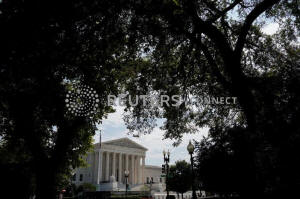U.S. Supreme Court to tackle gay rights, guns, abortion and Trump
 Send a link to a friend
Send a link to a friend
 [October 03, 2019]
By Lawrence Hurley [October 03, 2019]
By Lawrence Hurley
WASHINGTON (Reuters) - The U.S. Supreme
Court's new term opens on Monday with the conservative majority in a
position to take a more aggressive rightward turn on divisive issues
including abortion, gay rights and gun control while also refereeing
legal brawls involving President Donald Trump.
The court has moved to the right since Trump took office, with a 5-4
conservative majority that includes two justices he appointed: Brett
Kavanaugh in 2018 and Neil Gorsuch in 2017.
"We will likely see the court move further and faster in a rightward
direction," said Irv Gornstein, executive director of Georgetown
University Law Center's Supreme Court Institute.
The justices are due to tackle a larger number of consequential cases
than they did in their previous term, and they could end up producing
more 5-4 rulings along ideological lines with the conservative justices
on the winning end and the four liberal justices in dissent, according
to court experts.
There were few such rulings in the term that ended in June. In one of
the biggest rulings of the last term, conservative Chief Justice John
Roberts joined the four liberals in blocking Trump from adding a
citizenship question to the 2020 U.S. census that opponents called an
effort to intimidate immigrants into not taking part in the decennial
population count.

The nine justices on Tuesday will hear their first major case: on
whether gay and transgender people are protected by a landmark federal
civil rights law that bars employment discrimination.
On Nov. 12, they will weigh the legality of Trump's move to end a
program created by his Democratic predecessor Barack Obama that protects
from deportation hundreds of thousands of immigrants - mostly Hispanic
young adults - who were brought into the United States illegally as
children.
The court has arguments scheduled for Dec. 2 in the first major gun
rights case in decade, although the justices potentially could dismiss
it because the New York City law being challenged by gun rights
advocates has been amended since the litigation began. Other gun-related
cases wait in the wings for possible action by the justices.
[For a graphic on major cases before the Supreme Court, click https://tmsnrt.rs/2mZn6MJ]
'A VEHICLE TO OVERRULE'
The court could announce as soon as this week whether it will take up
two appeals regarding Republican-backed abortion restrictions enacted in
Louisiana and Indiana. If the court were to take either or both of those
cases, it would raise the possibility of a ruling that curbs abortion
rights, as hoped for by anti-abortion activists.
The Louisiana case concerns a challenge by an abortion clinic to state
requirements that doctors who perform the procedure have a
difficult-to-obtain arrangement known as "admitting privileges" with
local hospitals. It is similar to a Texas law that the Supreme Court
struck down in 2016, when conservative Justice Anthony Kennedy sided
with the court's liberals. Kennedy, who defended abortion rights in some
pivotal rulings, retired last year and was replaced by Kavanaugh.
"If they take up the case they could use it as a vehicle to overrule
their precedent from three years ago. That would be extraordinary. The
only thing that's different is the composition of the court," said Julie
Rikelman, a lawyer at the Center for Reproductive Rights, which supports
abortion rights.
[to top of second column]
|

The exterior of the U.S. Supreme Court in Washington, U.S., is seen
on September 16, 2019. REUTERS/Sarah Silbiger

The court during its new term also may be called upon to intervene
on issues concerning Trump's personal conduct in office, including
potential legal fights over congressional subpoenas for material in
the ongoing impeachment drama in the Democratic led House of
Representatives.
In 1974, the Supreme Court played a decisive role in the
investigation into President Richard Nixon during the Watergate
scandal, ruling 8-0 that Nixon had to hand over audio tapes recorded
in the Oval Office. Facing impeachment, Nixon resigned days later.
Other disputes percolating in lower courts include lawsuits accusing
Trump of violating anti-corruption provisions in the U.S.
Constitution relating to his business interests. Two appeals courts
have ruled on the issue so far, with one ruling for Trump and one
against.
Trump is also fighting congressional subpoenas seeking his financial
records from accounting firm Mazars LLP and two banks: Deutsche Bank
AG and Capital One Financial Group.
Some legal experts have said that Trump, who has prevailed at the
Supreme Court on issues such as his travel ban on people entering
the United States from several Muslim-majority countries, may not
fare so well on cases focusing on his personal activities.
In the House approves articles of impeachment - formal charges
against Trump - Roberts would assume a daunting responsibility. As
required under the Constitution, the chief justice would preside
over a trial in the Senate on whether to remove Trump from office.
The health of the court's oldest justice, Ruth Bader Ginsburg, also
could be an issue in the court's nine-month term, which will
culminate with a flurry of major rulings next June during the heat
of the 2020 U.S. presidential campaign.
The 86-year-old Ginsburg, a justice since 1993, underwent radiation
therapy in August to treat a cancerous tumor on her pancreas after
having two cancerous nodules in her left lung removed last December.
Ginsburg has made public appearances since her latest treatment and
has said she is "on my way to being very well."
Ginsburg's health concerns raise the possibility of Trump making
another appointment to the Supreme Court. In addition, another
liberal justice, Stephen Breyer, turned 81 in August.

"I can safely predict that the new term will have a fair share of
closely watched cases and I look forward to the challenges ahead,"
Ginsburg said during a Sept. 12 appearance in Washington.
(Reporting by Lawrence Hurley; Editing by Will Dunham)
[© 2019 Thomson Reuters. All rights
reserved.]
Copyright 2019 Reuters. All rights reserved. This material may not be published,
broadcast, rewritten or redistributed.
Thompson Reuters is solely responsible for this content. |